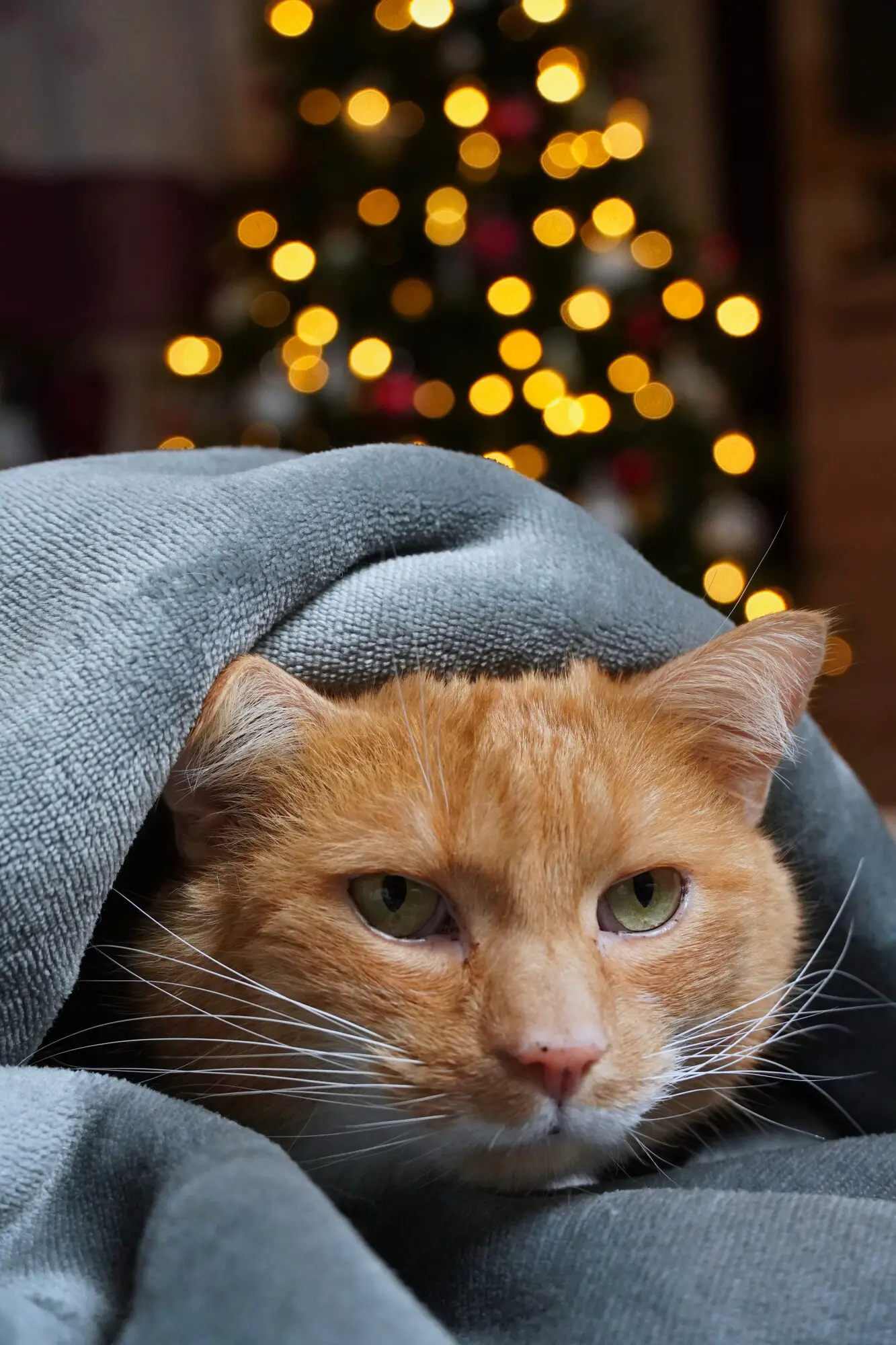Do you know that the average cat weighs eight to ten pounds and stands 10 inches tall? Their small size and impeccable sense of hearing create great anxiety. Even if you tiptoe at night, your cat will still hear a stampede. Do you ever wonder Why Does My Cat Sleep under the Covers? Lets continue reading and find out…
Your feline friend views the world as a deathtrap. That’s why they want to feel safe and protected.
Does your cat sleep under the covers? Are you wondering why your cat chooses this spot and if it’s ok? Continue reading to learn more about cat anxiety and how you can help your feline friend. Here are some reasons you may find your cat under the covers.

Contents
- 1 Fear and Anxiety
- 2 Itching to Nap
- 3 Extreme Weather
- 4 Pregnancy
- 5 Changes in the Living Environment
- 6 Health Concerns
- 7 Fearful of Other Living Beings
- 8
- 9 How to Calm a Stressed Out Cat
- 9.1 Take Things Slow
- 9.2 Create a Secure Environment
- 9.3 Provide Opportunities for Play and Enrichment
- 9.4 Maintain a Routine
- 9.5 Keep the Litter Box Clean
- 9.6 Use Relaxing Pheromone Diffusers
- 9.7 Try CBD
- 9.8 Try the Bach Flower Rescue Remedy
- 9.9 Use Herbs
- 9.10 Consult Your Veterinarian About Cat Anxiety Medication
- 10 Where Can You Learn More About Your Cat?
Fear and Anxiety
Your cat may be fearful of a new toy set or game. If you have an energetic child, your cat might be afraid of the commotion. Both the child and the toys can make them hide under the covers.
Itching to Nap
Cats sleep around 18 hours every day, and they love sleeping in dark areas. They want fewer interruptions, which is why the covers are ideal locations.
Extreme Weather
The sun’s rays can overheat the home, which is uncomfortable for your cat. This forces them to search for a cool zone under the covers. The covers also serve as a warm place for comfort in the cold winter season.
Pregnancy
Your cat may be breeding or in the nesting stage. During pregnancy, the body undergoes several changes. Your feline friend may prefer to go through the process alone.
This is why your cat would hide under the covers. It’s a safe haven to prepare her for impending pregnancy.
Changes in the Living Environment
If you remodeled your home or purchased new furniture, your cat will need time to adjust. Other changes like relocating the litter box can also cause stress. Cats like things to remain as they are, and any change fills them with terror.
Since the environment under the covers is constant, it makes a great place to hide. It instills a sense of normalcy and stability.
Health Concerns
Cats tend to hide when they are sick. This is normal animal behavior; they don’t want to show weakness to predators. If your cat suddenly remains distant, please visit the vet.
Fearful of Other Living Beings
If you have other pets, your feline friend might feel terrified. It’s a bit more complicated if you have two cats or a tiny kitten. The tension between them is likely to escalate, which may force your cat to flee.
Your cat will find solace under the cover. This environment gives them a sense of control over something. If you have a newborn, your cat might seek refuge.
How to Calm a Stressed Out Cat
Pet parents often notice the first sign of feline anxiety between five months and one year of age. Anxiety and stress may be the reason Why Does My Cat Sleep under the Covers? Here are ways to alleviate your cat’s stress:
Take Things Slow
If the stressor is temporary, like a friend dropping by, don’t bother to acclimate the cat. In such instances, relocate the cat to a secure room with their basics for a short duration.
If you adopt a puppy, introduce them slowly. Experimenting too quickly will lead to failure. Desensitization must be done gradually over days, weeks, or months.
Create a Secure Environment
This technique is effective for all types of anxiety, including phobias. You can give them a tall cat tree, window perch, or even a separate room. Make sure to put a comfy bed, pillow, and blanket in a secure place for your companion.
This secure area is especially critical for cats with noise phobias. You can also purchase a thunder shirt for your cat. This is a pressure garment with a soothing effect comparable to swaddling a newborn.
Provide Opportunities for Play and Enrichment
Begin a regular workout and play session with your cat. 15 minutes a day with a wand toy or laser pointer can help alleviate tension. Provide them with catnip toys, cat grass, and window-watching areas.
Maintain a Routine
Your cat may develop separation anxiety due to a disruption in your routine. Make sure to create a feeding, playing, and litter changing schedule and follow it.
Keep the Litter Box Clean
A filthy litter box can cause significant cat anxiety. Cats will avoid stepping into a filthy litter box. They don’t want to touch their own urine and feces.
Ensure that you scoop every day and adhere to the n+1 rule. If you have three cats, you will need three plus one litter box, which is four. You can also invest in a self-cleaning Litter-Robot that gives your cat daily fresh litter.
Use Relaxing Pheromone Diffusers
Feliway replicates the “happy” pheromones produced by your cat. Connect a Feliway diffuser to any room where your cat spends a lot of time. You can also spray it on any area where your cat has urinated.
Try CBD
This natural substance is derived from cannabis plants. It has a calming and relaxing effect on cats. It’s available in various forms, like treats, oils, and pills.
Try the Bach Flower Rescue Remedy
This all-natural stress reliever is laced with spring water and wildflowers. It is supposed to assist in calming anxious pets by restoring their equilibrium.
Use Herbs
Catnip and valerian are almost like cannabis minus the THC. These herbs may excite your cat, the bliss that follows should leave them at peace.
Consult Your Veterinarian About Cat Anxiety Medication
If everything else fails, consider prescription cat anxiety medication with your veterinarian. They may choose to prescribe short-term medicines such as gabapentin.
In severe cases, buspirone or amitriptyline may be considered. For safety reasons, never give your cat human anti-anxiety medicine.
Where Can You Learn More About Your Cat?
Now that you have learned more about “Why Does My Cat Sleep under the Covers?”, you know that Your feline companion depends on you for everything.
It makes sense to have anxiety about any slight uncanny behavior. Rest assured that sleeping under the covers is just a way to feel safe and secure. However, if you detect unusual changes in behavior, then talk to the vet.
Even though your cat can’t talk to you, it doesn’t mean you have to remain clueless. To learn more, check out our blog for more great articles like this article on “When Do Cats Mellow Out” to be the best cat parent.



